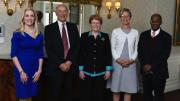THE GRADUATE SCHOOL OF ARTS AND SCIENCES Centennial Medal, first awarded in 1989 on the occasion of the school’s hundredth anniversary, honors alumni who have made contributions to society that emerged from their graduate study at Harvard. It is the highest honor the Graduate School bestows, and awardees include some of Harvard’s most accomplished graduates. The 2019 recipients are:
Caroll Bogert ’83, A.M. ’86, East Asian Regional Studies
Carroll Bogert ’83, A.M ’86, is president of the Marshall Project, a Pulitzer Prize-winning nonprofit news organization that reports on the United States criminal-justice system. A journalist and human rights advocate, she began her career as a stringer writing from China, whence she filed reports on the protests at Tiananmen Square in 1989. She subsequently spent 12 years as a foreign correspondent for Newsweek in China, Southeast Asia, and the Soviet Union. Before joining the Marshall Project, Bogert was from 1998 to 2016 deputy executive director at Human Rights Watch, where she ran its global media operations.
Lael Brainard, Ph.D. ’89, Economics
Lael Brainard, Ph.D. ’89, an expert in international trade, is a Federal Reserve Board governor who chairs the committees on financial stability, Federal Reserve Bank affairs, consumer and community affairs, and payments, clearing, and settlements. After serving on the faculty of MIT’s Sloan School of Management, Brainard joined the Clinton administration, where she served as deputy national economic adviser and deputy assistant to the president. In the administration of President Barack Obama, she served as under secretary of the treasury for international affairs and was then the highest-ranking woman in the history of the Treasury Department. She has worked to improve the Fed’s implementation of the Community Reinvestment Act, which provides support to low- and moderate-income communities.
Roger Ferguson, ’73, J.D. ’79, Ph.D. ’81, Economics
Roger Ferguson ’73, J.D. ’79, Ph.D. ’81, a former vice chairman of the Federal Reserve and a business leader, is president and CEO of TIAA, the leading provider of financial and retirement services for the academic, government, medical, cultural, and other nonprofit sectors. A fellow of the American Academy of Arts and Sciences and a member of the American Philosophical Society, Ferguson serves and has served on the boards of numerous nonprofit organizations, including at Harvard, where he was president of the Board of Overseers and a member of the board of directors of the Harvard Alumni Association. While at the Fed, Ferguson led the effort to make Federal Open Market Committee decisions more transparent, ultimately resulting in the release of a statement after committee meetings that explains the group’s interest-rate decisions and its assessment of future economic risks.
Jane Lubchenco, Ph.D. ’75, Biology
Jane Lubchenco, Ph.D. ’75, a marine ecologist, is Distinguished University Professor at Oregon State University, where she is also marine studies adviser to the president. Lubchenco has been an advocate of greater public engagement by scientists. An expert in the study of the oceans, climate change, and the interactions between the environment and human well-being, she served from 2009 to 2013 as under secretary of commerce for oceans and atmosphere, and as administrator of the National Oceanic and Atmospheric Administation (NOAA). Lubchenco formerly served as president of the International Council for Science, the Ecological Society of America, and the American Associate for the Advancement of Science.
Joseph Nye, Ph.D. ’64, Government
Joseph Nye, Ph.D. ’64, former dean of the Kennedy School of Government and an authority on foreign policy and power, is University Distinguished Service Professor emeritus. A political scientist and member of the Harvard faculty since 1964, Nye has served not only Harvard but his country in a variety of roles. In the 1970s, he was deputy to the under secretary of state for security assistance, science, and technology and chaired the National Security Council group on nonproliferation of nuclear weapons. In the 1990s, he first chaired the National Intelligence Council, and then served as assistant secretary of defense for international security affairs in the Clinton admnistration, whence “soft power,” a term he coined, entered common usage.
For more about the honorands, and to read the citations that accompanied the awarding of their Centennial Medals, see the Graduate School of Arts and Science webpage.









